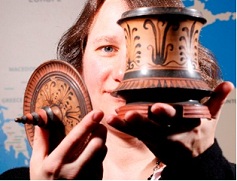The University of Reading is part of a JISC-funded project considering museum ethics, display design and object-based research, Object-based Learning for Higher Education (OBL4HE). As part of the project, Rebecca Reynolds, Visiting Lecturer in Museum Studies at Reading’s Museum of English Rural Life (MERL), has carried out a small-scale study of ‘Students’ use of online resources and preferences for design and content’:
‘Every year, students on the first-year optional module Analysing Museum Displays have a talk from Amy Smith at the Ure Museum of Greek Archaeology here at Reading, looking at the display there about the Greek symposium.’
‘This year I put the lecture online along with a transcript, photographs of the display, and a worksheet. I told the students to use the materials instead of attending the weekly lecture that week.’
‘Eighteen students filled in a questionnaire the following week giving responses to the lecture and saying whether they preferred it online, live or both. Nine students would prefer both, eight would prefer the live lecture only, and one student preferred the online lecture only.
‘Students liked the interactivity of live lectures, so the lecturer can go off-script, students can ask questions and also learn from their peers. Students also preferred being in the actual museum, with four students saying this made the lecture more memorable. Two students said that they paid tuition fees for more than online learning. The main advantage of the online lecture was its usefulness for revision and its controllability.’
‘In other words, what students valued was not the lecture format per se but the fact that they were with a real person in a real learning environment. Affective aspects connected with students’ reason for liking the live lecture could include some less easy to define such as the passion for their discipline shown by the lecturer, the fruitful discoveries and moments of realisation which can occur in a learning environment but which may be unconnected with the main topic of the session, and approaches to the subject shown by other students.’
‘Our recommendations are to make lectures as interactive as possible, and use online resources as backup. Tutors might also wish to ask students to listen to online lectures in their own time and save contact time for more interactive sessions – however, this holds practical challenges.’
Rebecca also spoke about the ‘online museum’ at our ‘Sharing Good Practice event’ last July. If you’d like to find out more, take a look at the OBL4HE project blog or get in touch with Rebecca at r.m.reynolds@reading.ac.uk.
